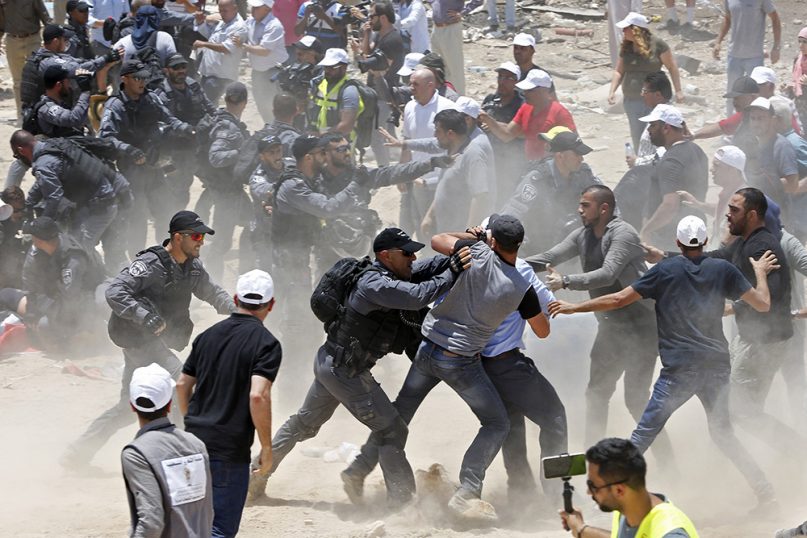(RNS) — Israelis and their supporters abhor it when the term apartheid is applied to the country, as Amnesty International did in a recent report on Israel’s oppression of Palestinians. The problem, however, is not the term itself, but Israel’s political frame of reference.
For decades Israel has operated on two different ecosystems. One is based on international law and democratic practices, the other on tribalism, with religiously sanctioned laws.
On Nov. 29, 1947, less than a year before Israel was established, Zionist Jews danced in the streets of Tel Aviv after the U.N. General Assembly approved a partition plan that recognized a Jewish state and an Arab state, with the holy city of Jerusalem as a separate international entity, or what is often referred to as corpus separatum. Israel pocketed these gains and went for more.
After the state of Israel was born, it applied to the U.N. for recognition, and the U.N. eventually agreed after Israel promised to, among other things, respect the right of the return of Palestinians who had been forced out of their homes and lands, or, as my father’s family did, left in fear of the violence.
On July 5, 1950, Israel’s new government passed a law giving any person whose mother was Jewish the right to immediately become a citizen of Israel. They showed no interest in the Palestinian refugee issue and never respected the right of return. Citizenship was to be assigned, not by birth in the Holy Land or to Palestinians, but by belonging to the Jewish religious tribe.
This is where the dysfunction began.
RELATED: Amnesty International claim that Israel is an apartheid state is recklessly ill-informed
Israel continues to be, since its birth, a democratic state for Jews but does not regard all of its citizens as equal. Nor is democracy extended to the 5 million Palestinians living under its military rule in the occupied territories.
The very term “occupied” is not in the Israeli political lexicon. Instead, it considers the West Bank to be the biblical lands known as Judea and Samaria. The non-Jews living on this land are dismissed culturally and legally, as is obvious from the armed control Israel maintains there and the indirect repression represented by the Jewish settlers. The latter are illegal under the Geneva Conventions and The Hague-based International Court of Justice but are seen by many as pioneers and vanguards by the Jewish state.
Apartheid, a relatively modern term, angers Israelis who want the world to embrace them as the benevolent light to the nations. (Note the Israelis’ evident pleasure in the recent welcome Israeli President Isaac Herzog received from autocratic Arab leaders and others on a visit to the United Arab Emirates.) They see themselves as the righteous country of the biblical prophets of justice and mercy, judged only by the biblical god who chose them.
At the same time, they are not willing to live by the terms of the international system that initially recognized their existence. They want it both ways, and this duality keeps being exposed.
How are we to reconcile the modern international system and the biblical tribal system?
We either need to accept the biblical reference point and expect humanitarian virtues of respecting your neighbor or hold Israel to account with fact-based evidence that is evaluated based on modern legal international and humanitarian law. Western support for Israel is based precisely on its supposed “shared values.” But if the Israelis insist on tribal, biblical values, then countries that believe in the rule of law, democracy, accountability and equality cannot continue to support Israel.
Of course even a student of the Hebrew prophets would argue that by biblical standards the state of Israel fails the test. The ancient prophets rejected collective punishment and called for welcoming the stranger living in your midst.
The debate over apartheid is a disagreement over a label that focuses mostly on race. We need to ask the question: Which legal and moral ecosystem does Israel want to use to engage with the world. Whatever they choose, it will come with a price.
(Daoud Kuttab is an award-winning Palestinian journalist and former Ferris Professor of Journalism at Princeton University. Follow him on Twitter @daoudkuttab. The views expressed in this commentary do not necessarily reflect those of Religion News Service.)
RELATED: What to do about young evangelicals’ waning support for Israel





